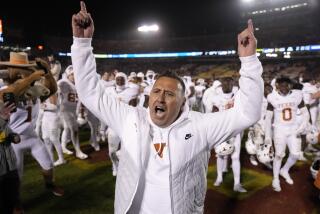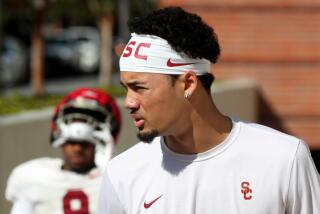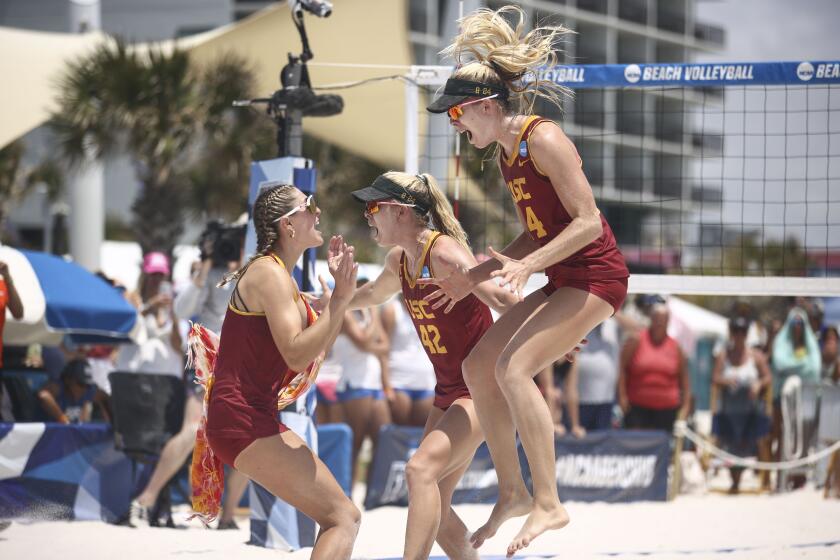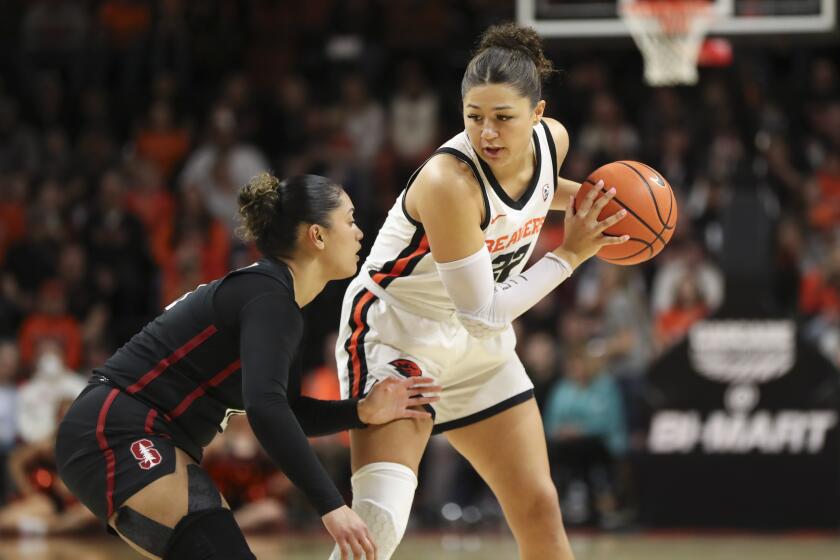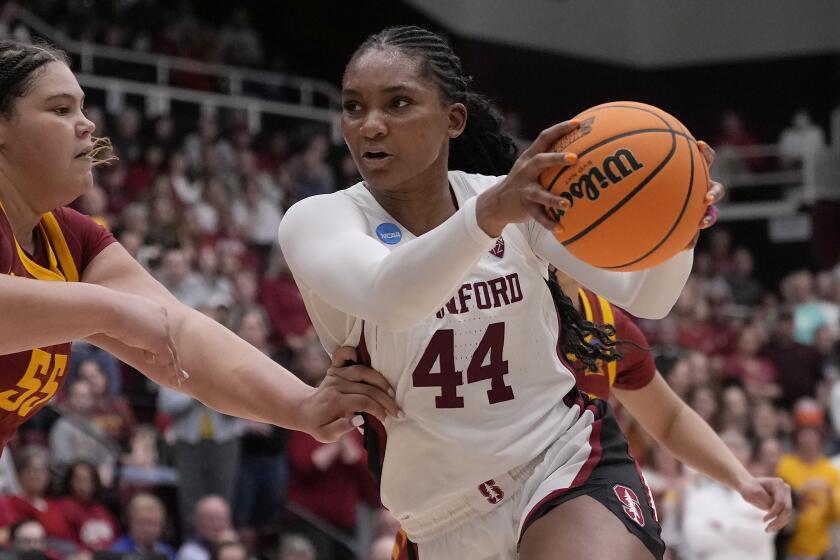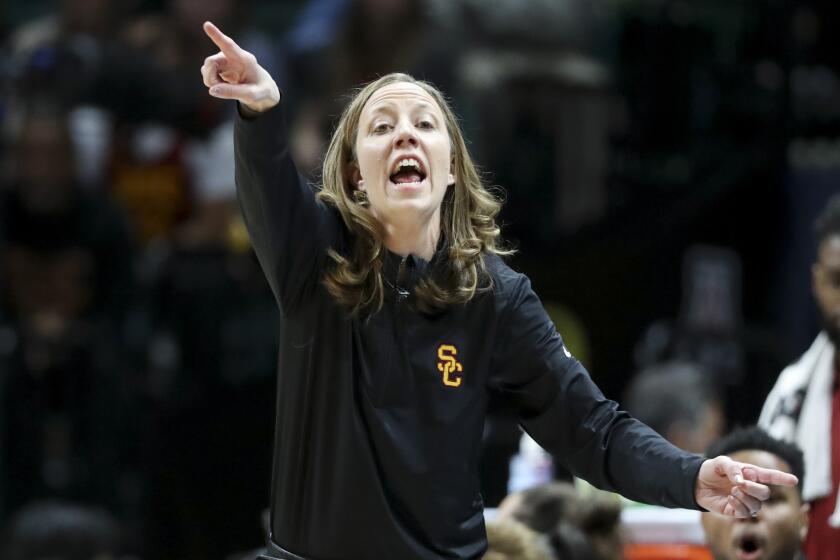USC-Texas revisited | Why soldier Travis Tofi kept his football career a secret

Matt Leinart, Vince Young, Lendale White and others recount the 2006 national championship game between USC and Texas at the Rose Bowl. The Longhorns beat the Trojans, 41-38.
On Jan. 4, 2006, USC and Texas played for college football’s national championship at the Rose Bowl in what is considered one of the greatest games in the sport’s history.
The Longhorns won it 41-38 to complete a 13-0 season. USC, which had a 34-game winning streak, finished 12-1.
The schools have not met on a football field since, but they will Saturday at the Coliseum.
In a four-part series this week, reporter Zach Helfand explores topics related to that epic game.
::
Sgt. Travis Tofi discovered quickly that Afghanistan’s Kandahar province was a good place to learn to forget.
He woke up at 6 each morning. He worked 12-hour shifts, repairing Army vehicles. He visited the gym for hours. He kept himself busy so that there was no downtime for his mind to wander.
Before long, he hardly thought about USC or the Rose Bowl.
There was one time when friends almost sniffed out his secret, when his past was almost wrenched to the surface. Tofi played in a flag football league on the base. His buddies assumed he was too big and too awkward to be useful. Then he ran all over them.
After his team won, one soldier said something funny. “Man, you should be in the NFL right now,” he said.
Tofi said nothing, but he remembered: How he had played in college football’s most-watched game ever, then tried to run from it.
Tofi was a backup defensive lineman when USC lost to Texas in the 2006 Rose Bowl. The loss wasn’t what shamed him. Rather, the game was so great, the players so magnificent, that he thought to be part of it meant a career in the NFL was inevitable.
“Most people, the first thing they ask me is, ‘What are you doing in the Army? What happened? Why didn’t you go play in the NFL or do something else?’ ” Tofi says.
“You don’t think I ask myself that all the time?”
Tofi grew up in American Samoa, in the tiny seaside village of Aoa. As a child, he planted bananas and tended to pigs in his family’s backyard.
USC was a different world, but he grew to like it. He thought he’d go to the pros just as teammates Frostee Rucker and Kenechi Udeze had. It wasn’t until after his career at USC ended that his defensive line coach, Nick Holt, called him into his office described the long odds.
I didn’t make it. Look where I’m at. I end up joining the military.
— Travis Tofi, on why he kept his college playing days a secret while in the Army
Tofi wouldn’t get drafted. He’d be lucky to stick on a roster as a free agent. Holt offered an alternative: USC had an opening for a graduate assistant coach.
“Being so young, I was so … I don’t know how to put it — so narrow minded that football was everything to me,” Tofi said. He turned down Holt’s offer.
“I really didn’t have any backup plan,” Tofi said.
He tried out for the Washington Redskins but didn’t make the team. He tried out for the Canadian Football League, then played in the AF2, the Arena Football League’s developmental league. When the league disbanded, he was out of a job.
Next, he was recruited to join a program called the All-American Heavyweights that developed amateurs into professional boxers.
Tofi had never boxed before, but he liked the program. Every day they ran. Every day they sparred. They got paid and housed, and they had food whenever they wanted. But he was injured constantly. He had three surgeries and was eventually dropped by the program.
It was 2011 and Tofi said he was “panicked.” He’d never imagined a job outside sports.
Tofi had a degree in sociology, but the unemployment rate in California hovered around 12%. Tofi moved in with an uncle in Barstow, where he sent out his resume for a job in social work. He had no success.
His uncle had served in the Army and worked at nearby Ft. Irwin, but Tofi had always brushed off the service. As a boy, he made fun of a cousin’s JROTC uniform. But he was out of ideas. It was either the Army or move back to the island. He enlisted.
Tofi was sent to Germany and later deployed for a nine-month tour in Afghanistan. He was nervous at first. The day his Army transport plane landed, the attack siren sounded. “Hell no!” he thought. He was the first one to sprint into a bunker.
Eventually, he grew used to the attacks, kept safe on the sprawling base and soon hardly paid the sirens much mind at all.
Even in Afghanistan, football was everywhere.
“It’s funny, in the Army everybody thinks they know football,” Tofi said.
He never got used to playing flag football, chasing some guy in fatigues, knowing he’d once chased Vince Young.
But he kept his past a secret. Told no one about USC or the Rose Bowl.
He had his reasons.
“I didn’t make it,” he says. “Look where I’m at. I end up joining the military.”
He assumed people would look down on him. He didn’t want a reminder of his failure every time someone asked about Reggie Bush or Pete Carroll. He didn’t want to think about it.
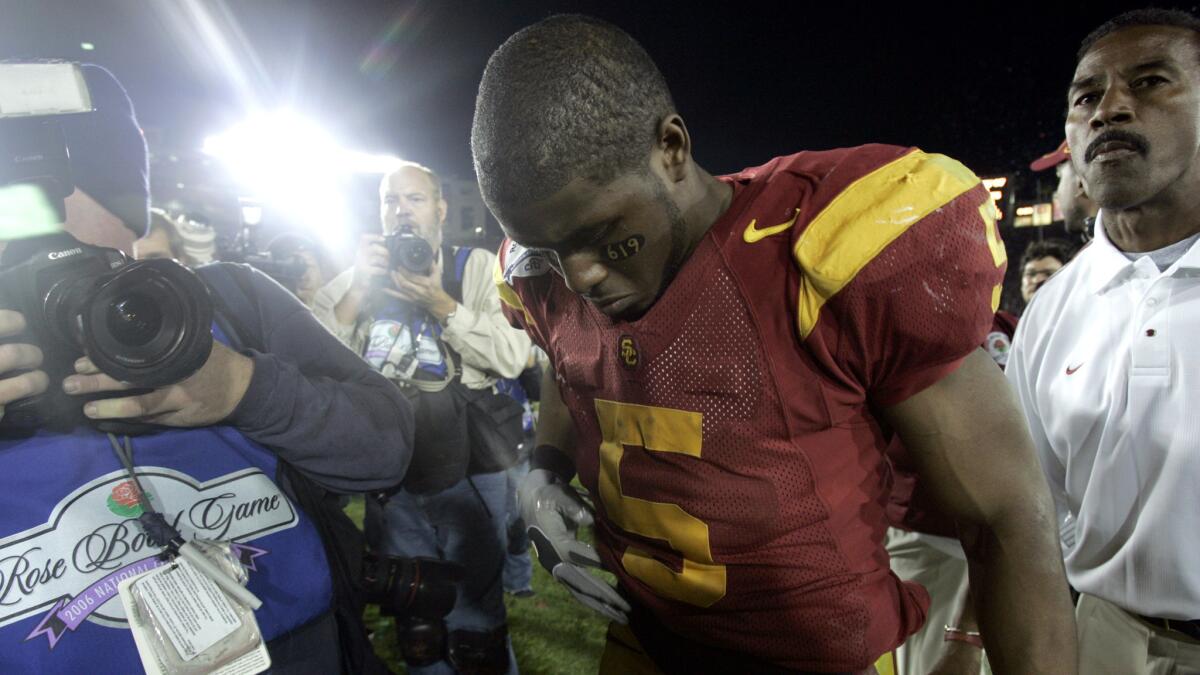
Instead, he busied himself with work and a growing family. In Germany, he met a woman, Anahi, a medic in the Army. They married. They had a daughter, Leah, now 20 months old.
Slowly, Tofi’s pride grew back. Slowly, he built a life. Wearing the uniform he once mocked, he was thanked in the street by strangers when he returned from Afghanistan. People paid for his meals at the airport. He tried to tell people he wasn’t on the front line. They didn’t seem to care.
He returned to Ft. Belvoir, in Fairfax, Va., and worked in a shop on the base, repairing machinery. He earned a promotion to sergeant. Now he ran the shop. He commanded other soldiers.
Feeling more comfortable, he opened up to a Samoan soldier named Ricky. Tofi told him he’d played football. And he was pretty good, too.
No one else knew. Tofi used to talk college football with another friend, Specialist Stephen Luthy, an Oklahoma State fan. Tofi never mentioned the time he won a national championship against Oklahoma State’s biggest rival.
One day, Luthy was in the office with four or five other soldiers talking football, when Ricky mentioned, casually, that Tofi had played football at USC.
Football at USC?
Luthy was skeptical. He pulled out his phone and searched Google. “There he was,” Luthy recalled, “padded up and everything. I was kind of starstruck.”
It caused a stir. Word even reached the sergeant major.
“You’ve been under my command the whole time,” the sergeant major said. “Why haven’t I known this?”
Tofi still does not talk much about his football career. Luthy thinks Tofi wants “to be judged as an individual soldier. Since I’ve known him, he’s busted his back to get where he’s at.”
But he has found a measure of peace. He’d dreamed of attacking quarterbacks. Now he finds meaning in being a protector. His work keeps his family safe. When his four-year enlistment expired, he reupped for another year and plans to do so again.
Being in the Army, he said during a recent phone call, makes him feel part of something larger than himself.
It was the same feeling he loved when playing for USC.
He said it felt good to remember.
Follow Zach Helfand on Twitter @zhelfand
More to Read
Go beyond the scoreboard
Get the latest on L.A.'s teams in the daily Sports Report newsletter.
You may occasionally receive promotional content from the Los Angeles Times.

